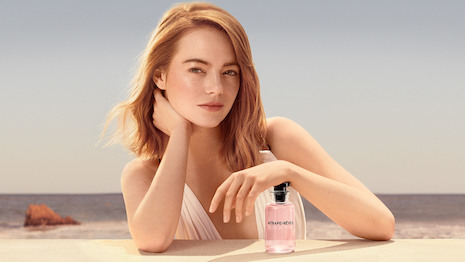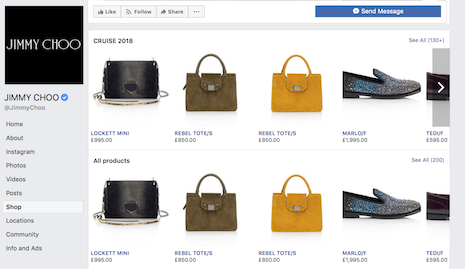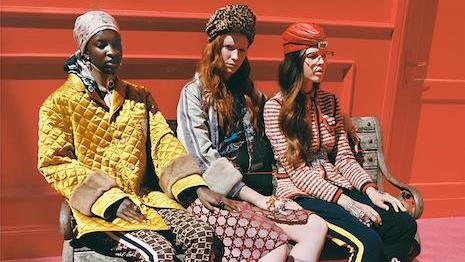Italian fashion label Gucci excels at digital strategies while other luxury fashion houses lag behind, according to new research from Gartner L2.
Today's luxury shoppers are increasingly drawn to digital channels, but most fashion brands are not keeping pace with consumer demand. Other retail sectors, in particular department stores, have a better handle on meeting shoppers' ecommerce and digital expectations.
The Gartner L2 report ranks 77 luxury fashion brands operating in the United States and Western Europe based on their digital performance across ecommerce, digital marketing, social media and mobile.
Digitally competent
Gartner L2's Digital IQ Index yielded few surprises in its top tier luxury fashion brands.
Gucci and French fashion label Louis Vuitton were ranked in first and second place, respectively. Both were given the "genius" designation at managing the digital environment.

Emma Stone for Louis Vuitton. Image credit: Louis Vuitton
Michael Kors and Jimmy Choo, two of the three brands that make up Capri Holdings Limited, also scored in the top five. They were among the brands labeled "gifted," while other less successful categories included average, challenged or feeble.
The most digitally-competent brands implement new ecommerce and social strategies quickly and without setbacks.
Social commerce, especially through Instagram, remains a top priority for fashion brands.

Screenshot of Jimmy Choo's Facebook Shop tab
Instagram Shopping integration has grown from 12 percent to 42 percent in the last year. After Instagram successfully incorporated shopping features last year, a standalone retail app is now in development, rumored to be called IG Shopping (see story).
While 21 percent of brands now include a Facebook Shop tab, many of these brands have very limited inventory available.
Despite research showing that click-and-collect services are more popular among female consumers with higher annual incomes (see story), only 29 percent of the luxury brands evaluated offer click-and-collect. However, with 71 percent of department stores having click-and-collect integration, affluent shoppers have less reason to shop a brand's own Web site.
Fashionable innovations
Recent growth in the luxury industry has been propelled by brands that have mastered balancing heritage and innovation in response to changing consumer tastes.
Louis Vuitton has reached a brand value of $41.1 billion by embracing more contemporary trends, making it the most valuable global luxury brand. Louis Vuitton and Gucci, along with Dior, are also the fastest-growing luxury brands (see story).
Both Gucci and Louis Vuitton continue to innovate in the digital realm to provide customers with better shopping experiences.
Gucci has turned to digital media to create unique brand experiences beyond its stores. For instance, users can use an augmented reality feature on the Gucci mobile application to virtually personalize their space with pieces from the new Gucci Décor collection (see story).
The fashion label also brought its customization program online for the first time, expanding what was previously only a bricks-and-mortar experience to a wider audience. Gucci’s new DIY tool blends product photography and 3D computer modeling to create a more lifelike representation of what final combinations will look like (see story).
Louis Vuitton recently updated its mobile application, to offer access to the entire catalog of Louis Vuitton products with a personalized browsing experience. Consumers will be shown products that reflect their interests, as the app will adjust whether the customer typically tends to buy handbags or jewelry (see story).
{"ct":"OdU5oeXN7OA+cTYYSiEYtX4fCsThZ38HjmsBG5fWseA\/PdYgCro34l6mzliAqiQFBQ2DjdLvTjv4sXPVTFVwgHRRtBiOcIg6RfxrVYDsAhxdxwfJXJc92fLKwM37liRtP3w+4EL5h\/l014pMh4T3ZLHh68lXwIXUgx03TcUlXSKLCSMu3zaMedGXMZpGahtA+bsjtNhv9qbsRGZkTmTNCFvVYcbZmvfz4mCbyx4LWLQ+nPDUErOes16Zb2geXYc2nrlMcwNRjIrhdTRX55EYF78me3nv0APPMZ8xKA3m5YjfWXyHHwMCN4s742FnVgkck7rKOEUBQV6prX5jaijcX+kROm2pjh3KINre2dEKN6K2HxebOt0oBG7tuYCcaZ3cHvy8Md3AJ1OlHRVE3IIL2yUtHuN\/6LMX6n215IcpG6Ih4UE34hPheO+nlCsO56JsQTi30vwq75wMNdMjz4150dofKJV6H5SYckJoefcJw\/ZcwQcOAQtWUwSO4miOt119dc3CjlQ8dbm1nfuu2N+s+amNHRioVsWdLCGEqZJVaDF8k1NSa+7VFEbfedUUYtj28lpWIGtDbLkojqg\/EK6K6huG+gKh2u0nN\/PVEISQj3GSHoGc7WRnfWaiGQqhQ9Zyq6Xf56LEBjzT8ho6mc6YB\/wcRtuVmz1LM04UuMdi6plKaStsNYnHH+\/ZcTFBerHhrG7PrEikl\/V\/i0X0uxBev8MflvYpM0W+CaZL5ogw9dckMD3NGke7fA12DSo6fFhBQhUrKuZegS2PCk69kF52xfW3gv87gzrr0C9jYM51YGlo2QJuK7iacAVpjL0lwnhJrV2bs0MmAMWLSlLpG+is98aXXI0rZRtshDQstsHL8a44WQANgXd80o+GHMNjBuUAghmBttbQ2pPq9Ojjtx7sEHaPGKRc1L1v8hbR7E0khbh8ogChlWtfYhDJ44Eu6vSkGQSCjkw2lE2PoPIInftHiew73eGyV30a3W1XhM6XeWdPMZRr3IxX38L+oM9KQc+\/VxyPpf5A0+5DYmLcI+QiFN4r9rASu56qL2G2L5pwRPYoyAgYXDM0AGoYIA8Rqcu3v0T+pcv0UOH1Lh5HYLaFtW1knc6phQwz\/vNudXpk8\/sI38qan4pGV4KLTveZ+j2a5H4QZzEn0h6uawtevXuS7yiR3bmInofLgYL8aT0hF+9w3qKUDp4sw8cxT9Nkdk1Rq6yCUnk06YvGxD\/UvvSGMcHDpfMeGNnqx\/t\/oCt+JQSxjoAQO1XzD9sIV9eQ+AXTAM6hTqvzbpUHiGK+nwLkC3EfuG5qRe4TTeFAe4e6FwdPnr6W6jvII9guOJfrcUefJuIsM12TPsAC+Kz\/0ekp+yBl5tmu\/MfCAGy1A+7lFRobFjzO8RgxANZs7wqaTGILMHCoVKv1t1GcBv6DMXSs5yHMQ0HlLR2P6J37AYTLUPIyeX1iqQH7KXZtjR22VM4KJkfRbtMGy1HMg1c4gyk5JUkTjijmec5yUKztnpYI01SaJYAtwnxrlXEpMlzShU9vf7w+huKN8Snb80MabmmdpauqORblhZ5p5kzWhA8gLnfK\/ryL1wexQEjqkN8\/SCcR\/8TAypUK64RlmnwNCQE+zPJnanhVijobdbw6LiQ0GB5cZK\/gF1NQ7PJGcMrh92+jSIpgZc5gJmvyl\/4ElUBe7Ma4Wfh8dwFZDBNsZyNvwzvRVvlsB4GCbFb71n+INqNz3WCqBfD3YWgd45wGGMAZ9oIC3sM55hx2vjfDlmM7tT3QEEBsjgrsw2TU1vsirIYPOHna4152slsMSYVkRIDHTWBafMVyNOrFBw5fcpgwtNgfF4jojK90mFdfW1nOs86X+dr7rMnckidIumdH5SKeUnm\/1TnXJNqbqRpIa7eeIm3+tYHdkLOtRPrCqOQUOj6rKi6LI9a3qjRHqVtz6jhOflli8jZC\/1KV9DkrBWBfb2kbcjAD8h+EaJpGnLG3IruQYzVZIrd4JyrJyUBz0VcUl2jmVM86qTpCO7sRFqz87CHtAKTEErkvTNxhGf517d+TICD9yYU53kfdIfnnti+zUFb3UE1z90PY2\/\/I5yNhbjVnc1w64K+qriYTHmoD2EDeNeuJ+DhbCWuYLkWltPtdJpD1gVTPQ9BOnccrRg1+sadX3aZxsaK9g14fkIm5rsclnTKeNdtm5nEghDgfTZmoO6mA8ptHwWvVqqpJgGM634OSl\/8DzSGpbxYvcz\/ykwXKQwuluijg\/PixlVslm9tY7YNmrmoIBRtzcYF70wXoDKEFfDjQQMNvusnWGFk2e7jcXPA1GOkdowOYqPHOhzGLnW0jYHXUxgSQJnHYecXg4lgkyc6J7nPwNqcyHX8R81dXCq1I6rKg36MRtZzaiaBC1vq8gSWIJ4PAv2TJ+yVz+iItkZ\/j\/bF06ge1I2VwzkGuaUAnGEQCkByv9KFpDjEwFHuKUnhEy9+1uQsVWiHCN+JPnhqn9PW8f3rp5W1zV447XGwpF8v4echEigV26uxWTfo07n1GAnzzDCXbfwNHABulY9kMxs97TMVMsFDpsl0vqHtRI5bKQdVAbw7qI4NSU3j+CQlszzVZgfihclcHulhertEXtk\/VGyGkZEtGAl4XPnUVtmnQROLRZzMm+aPqAgoSDaG96Qa66KBL1CWZkHanVKESHUwb7pxFsOlYFEEcxl4bcMfTaqgRvQwVPtDKFcqm6cD3h\/J8KZTprWjVSeMKPc1oEdUE79UKlQD+ErPc0MUGwxedV4+aJX1D2augl6couSKDlvNjf6cIR\/PzxaM72jdWN4rBSigXOXLcZNl9ZJRD25ZRRwahlF4sv7N27SsSywLg7agKB1lpFVURJZgl+9THh33+zbXg\/Q4PFdz6K1IobT7v5uTdaejBGGJpOpc87jPsdvkJZIqhNmyoWjdc7yczNlvSvdsEMxIIbJ7CPcSEOLqs1nDHLGF\/x7mk7oaOOHaQuOPKrFwokNYPNN8nguPOfi2\/TSEwrbUUJdDRcKF1hhHMK0Ve27QUApDot\/jIVB8cJj9gF\/80AiuUXVUWneESGyNGArN1QTFBMuAyqOga7LSi1Od92sxlLYAOUl\/nupxO0iEkG9CGyaFLnmQRZhA3nj7lht7h6+LoD8NGYE\/CuXvNDIsbpWlwtMfP+R\/tMBZ1gKTBsyArmEaZ8rlOUWee\/8MQO\/01DwAkCtVPaqfrO5fjPTuCYgkf96rL\/Hhan\/g4H2s1JGWuSaV5Vv3SqgcRFdcLoMgnEaRjHO4mFGn2qTIkfgStrc2m7We93LDSt90\/BuiLa143x8Dfl2tOlq1dqGDl6tzUEdf\/nx780brKRPt7d9M+zHjKIniEuMVbQMThqXLYrK2g8aE8\/In1IQHtwsKLOTdp2BEWqC53vXzn6dPWhxZl\/qV\/rMAk04YuDO0K2ii9xetPhBaawKG3GarBKMYhZuMTu1dSGeKJH8dTYFaKHIA+JHOy47i3zY8L5Hwi3+FwU5ttj3KPvqs7z2w0oP8wqHPSgSTbwQTA9XtLjElZ6TqZNfhA4Bbcv20XYROpuoUC8I6aYKujvi4dH62V4aowcPkO5hoyP242YiZXNopJN7rcEvnUXdAW6lweVri1y+CqeeRn2b9TzczxQNCFkuzw1B7kwsdYhHDQB+hz5CFTnOZVvT19B7uhaFLuo6ZSUqyrDMozj501JHdaQupbTpJv0cpxLETr9KYNW4odz5GCsNBxGBTPP9sdFPKYMYB\/Xxdo7N+rhiPt\/FWH1sptkAZ1az3uRvDFNGUSMBx+vweg5tC5cKOuGA8Io19hPImM55brrqtI79DmooRnIPMi6HRvhPJ\/AAKdUGhJTtjYAiOnaoCJT4jgjckwfjBp1GyP2eqgiDSKJB0SCaZ+Bm6hQkLJhvQoxAcef44etiR4uznQYaF9+3N9+v1WEeWYsdp1iR4w+dSU8I0xPnoJgG+YEW4\/FgEuIaYkRIbQ8HaCXJia+FwAhu24mcXfzEXKRZnQ+Ilf8V3jbtSihJFurFnLRmaOfHLepyPlY2nf1rrRDgA4U0HifD0qGTqhiAPipaefIrE88mVcRzgeHVSeZhfWXBM7uJRyIdBvc8bCMXsNr+YkAq8ApTVpI0Ty6\/QyFCAjLzMGsg+64SoQXN0TClcWS4i2k2HxPpqPJAIi4OCIPPmhrcE6u60IBNOJpB9xt8Tb7+6SlHiNQKW\/BSPZ4it1vmd38M1KWVm8epVZEnHx151DRlKngu5eDSR\/0Q6c+aCT4+XuZPtTkP4E4DSeSwNXLH6Cpz1+vHeUlPrO1l1GirVPVjoOvjIp0wPS3uPrVZ46ZKzpF0BwEPXc49E3AL87RlrHZm2myazVEhsN1NryMpyuyCS4k0TpRMT7B1VpTIn+fjZzPeoBHMledytc061iT9AZDqqOOZN6EO0nX9g1CO\/QLpuK2CBj2CitB2jqHPgk0bA0SjL5I7kqhbpCfidun2tQbg7mrfbW3L4AI\/fobYED0Su3UGtyKT3jWgtkfOH2bFBWwpI1mrgP+xIn9Kxf9AYWMHA6OsQgvHpYICbxAgCQwOMGQFapXBN1l9M31PtI7Ld4fS7anuNQq6IGDxulqqdFMVmS\/YwDgWhDUQCGYAKZRoD5jCFeIo3KhpPsDzFm4iWGNw5zAr2TrMmJ9DnDV+kNC7z72i6vusk\/iSd4X35\/YNrqq2925TvnNXoxf+0rGYvml4NgLfQgc6kfns\/7\/YUokZteGDnSJbgVrtaQORX1e1v3qxmXEp3+6hDBIpCdbAaUDuxv\/vYQhokufjn7MxsQNT4igLBuwM5oPmNy70mBaDjnvfSK1mxcQVpWTtRJ3QXJ2ujZlTPVK03\/XazAhp3ttEPX\/KGgAE4\/don7SSV+Jye0xtKJJvjXPIwpupXYIsZpsPxQzEB676HtNF57LXtEvgN6QD2bRZOts0wN8svHvaiB\/6hya2uVBNW4eXFZJ0W3RGrkdG\/o0fv2\/whuparZ10FTA4AE1RKL5saNJEuEfQVJDv1chhkbBO3rmRO04P6GueNPdRFVjsGfctr6+0GAJT250a\/f+mEXcKCTb\/hAfSmutseKBR6vTqnoZtBJjoNxD0UQMLqy7StaSjfqiWoD2r\/\/37D+9bGebU5XpYqil1qr+7J4R\/j7dNr2qLXKlh4RQr5NVkgWcP8tPXiqck23sERlowK+DMFkFOuYrhDHpGTiAla6y7EbmUdRvuAam46Cl\/d38JD8bhH+v7yCF3DHlygDyti7UJQrmIgusUSNIAvQ4iDJaaxhzQxK+e5zsTx65sRHb9zkP90Tftyc7uZv8k+sJjHo4oAplTb62DxpwID9eFN9uicVlFHVPnrzVafWYLT9fVZnkyBquDsmCYxycE5pet3i9tOqx5C5w1deNNxEnJ0ewLUGGZk+dYcSdshI1alKB2bfrFy9eR9F+172+R7euwjGZSutW30tgRWNyeRE5gEmP5\/Kj0+df4\/ZClta3ZRSTLvjyFZb6xCQ6mKWFRuJ7a6AP+kMz8zZPT5pVM04ZYvvtdVmuzodxhI8u8OLpOZRPExpOVasiGv6dUUPxbvK87hpoZxLRD3WD9i8BuriXeyZqCqQF14NDKUx5D7qi1NWIAf64\/NOaskxaDqMocKfgwjJvgUwMpeAHHbjfL94QKdRJzg2\/SmJbK4JcpWAG\/hoQpSsU3cqirVHyuf27dCjDxB6eVyNUWJC2biTfRwVandYP1RZ8HasrLWC6cfoGKiUsFOcU92MZjqOCOpp2VQTu6376Z9piDQA0WXpeWvBRnJ9k0gqb6Zx7pPTFC77WB0yt+eKKgPLwjOKiTNNiLtuviMQXl7Ym9y\/B8IhSsVml9beQtXnqDNuDymf1W2OyfIf1vEaw0urO6XhL4KGUn54XR0xPvUyA9jA\/0iFss0p3CZ6SxlUj2r\/PnOR9SXshG2ifnqPW6o25z+8viW+BnrmxehMCzLp0ye4baarDK4PLHgWPmHoXHga6QH2ahZXx0gVlhC42LHcFz87BdPSt38qEWjxQmBRXL79kyySBD\/2ESP2Kk4p0wvNsMpoPyu0U+OFfSn5AzGd9ePZe81EnG1ZsRgF3DdhA39ld3umQ4X801P9ZI3UncFAGNABbtG7WlTPRAS8UAm7p20LbKr7\/XQeTAye6CfM93Gsko\/rXZtwR9m\/0iyfyDA8RBOq7izBmNwo1cFnOuppUZypnhNtO3PP7RjfUtS55ZYBYF1XSfA02mrOAZCyQNJ1onLcebIDyXpN+AtM5zfHAXNEqu5MDrKFEy8t54d35QmEADJUpFaOd57Bbx1xSPgeAlJB4PuBjHJl\/vn6pXhUZWh4G2mKNslDes0T+9wocvszIoM98PjJg0Nosav53+8yf+GfGg7MCAXk080wsdWz96StUfdsiPxuZwa7DXMjHvB42Cle6IYS3nbRM0NnXhB6MzlVAS7UfrLSMt13cbb4VCjHnNNcYnlWhWRXBO9HQpg9Qs249u80JCEI7Qn7ne1aClQLOY1G\/YPxxaN4wF1WKP7JyeyrVmGEjn6LX6Z9TTJvAODOv1i6REK1N7a4TOzTUYMr84SggFj2aR4zQH73jOlSjbtqS7aJydJtCRPGVF0rU1GNaZyTnukZdvTQBn8ZlmdG8UtglQ2IZma4xGRUOV4AaWjTJRy6Mhfkh2c6WdQyVOAoCM0xBtASseVw99yGsfrLzenhqQtEE+SmuC6XLc3ulc+CvjUygyW9FL8FWFj7OCI2m1v0+qdRY4FKn1EmYyqoQqfAgfkgc6\/BEvt+mFwW6Gz2oDvr4GfgRY0WwgK6DE8uF9lryNd1QlMSGfEwiWuDyhYSs8kv4xiZ0+jATVuThAzCi5wRySB1\/BDrj5XJnUr8eDZPAn9E\/Vpm4MHRHRR4FtpzcwTCw1WroU3hbZlOfLU6wyqUl9BdEAFMn4erb2zJmjfHfiN7EWojwC5OgDTPwNo7f7QFN\/xvTapVpO9l8heGL+ZByH8JBp44aqrBOhfrJM1+flHWpebQDE+UV8x4XloT5xAA8eG6Zlh0gTGvCArWXpHTwozFqSBwlfivCPMd6HAu6MGCzW7SBU\/g\/+iddgfzreFuiciSh\/n93TrEI+BNvFr2CsB9qw4F6W5RW36\/3sKY41DzPxBQ4cijLACNU6nhkgoSH3BCIjsnveEDlIG9OmXYtIarJb5Xai7V5CsUQaPDCnQlDmDfoUgB0J7dgCcBxMOxX2B0u8Qe+AfviS4ov+7qPWWXZfuEoVVFAFpe3cjiQNh2OqHFI0JLHZ5Rj6bVh46E3Lu0+38=","iv":"28c3d2bf6d7e6f38fa099f577576b5f3","s":"447a49b5c3d5b5a5"}

 Gucci is winning with millennials. Image credit: Gucci
Gucci is winning with millennials. Image credit: Gucci